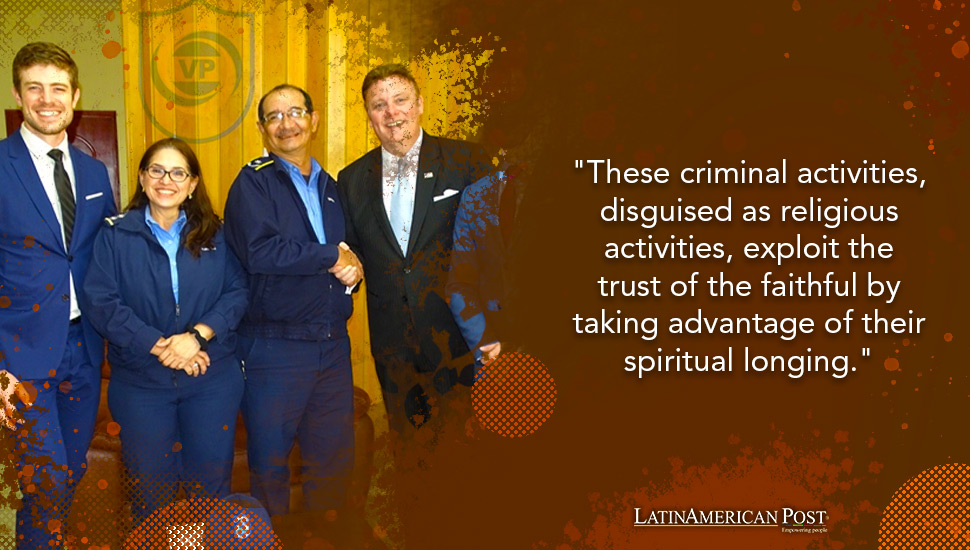Exposing Hypocrisy: Criminality in the Guise of Evangelism in Latin America

The recent conviction of 13 members of Nicaragua’s Ministerio Puerta de la Montaña for money laundering unveils stark hypocrisy within some evangelical groups in Latin America, exploiting the faithful’s trust and illuminating the broader issue of religious organizations masking criminal activities.
In a revealing incident in Nicaragua, the evangelical organization Ministerio Puerta de la Montaña became the epicenter of a scandalous revelation. Thirteen individuals, intricately linked to this religious entity, were found guilty of money laundering, shedding light on a disturbing trend where purportedly pious establishments are embroiled in illicit endeavors. This incident not only questions the integrity of similar evangelical groups in Latin America but also exposes how these entities might be exploiting people’s ignorance and trust for unlawful gains.
The case in Nicaragua is symptomatic of a more extensive issue permeating Latin America, where certain evangelical enterprises have been implicated in activities that starkly contradict their professed moral and spiritual objectives. This contradiction strikes at the heart of democratic values, revealing a manipulation that undermines societal trust and exploits the vulnerable under the guise of spiritual guidance.
The Exploitation of Faith
These criminal activities, masquerading as religious outreach, exploit the faithful’s trust, leveraging their spiritual yearning for personal and organizational gain. This exploitation not only distorts the essence of religious teaching but also undermines the societal fabric, eroding trust in institutions designed to nurture the spirit and morality of the populace.
The involvement of foreign nationals in the Nicaraguan case points to a broader, more complex network of exploitation, with tendrils extending beyond national borders. These connections underscore the sophisticated nature of these schemes, which exploit international ties and the often-sacred veil of religious work to launder money, among other crimes.
Undermining Democratic Foundations
Such malpractices by evangelical groups go beyond moral bankruptcy; they represent a direct threat to the foundations of democracy. By engendering a culture of deceit and manipulation, they erode the principles of transparency and accountability essential for a healthy democratic society. The ripple effects of these actions can lead to a generalized distrust in religious institutions and the broader framework of societal governance.
Looking beyond Nicaragua, the issue of criminal activities under the cover of evangelical work is prevalent across Latin America. Numerous instances across the region show a pattern where the guise of spiritual mission and charity work is misused for personal or organizational enrichment, often at the expense of the very communities these groups claim to serve.
Towards a Solution: Accountability and Education
Addressing this pervasive issue requires a multifaceted approach. On one front, stricter regulatory frameworks and oversight mechanisms must ensure transparency and accountability within religious organizations. On the other hand, educational initiatives to empower the populace, enabling them to discern genuine spiritual endeavors from exploitative schemes, are urgently needed.
Civil society and vigilant media play a crucial role in uncovering and challenging the hypocrisy of criminal enterprises masquerading as evangelical groups. By fostering an informed public discourse and scrutinizing the activities of these organizations, they can help protect the vulnerable from exploitation and uphold the integrity of religious and charitable work.
Looking Forward: Building a More Ethical Religious Landscape
The path forward must involve a concerted effort from governments, religious leaders, and civil society to foster a spiritual landscape where spirituality and service remain unblemished by criminality. Establishing clear ethical guidelines, promoting financial transparency, and encouraging community-based scrutiny of religious organizations are steps toward ensuring that these entities remain true to their spiritual missions.
Also read: Digital Threats Undermining Democracy in Latin America
The conviction in Nicaragua is a stark reminder of the potential for corruption and exploitation within some sectors of the evangelical community in Latin America. It calls for a critical examination of the role and responsibilities of religious organizations in society. By advocating for stringent oversight, promoting public awareness, and fostering an ethical, religious environment, the region can hope to safeguard its populace’s spiritual welfare and maintain its religious institutions’ sanctity. This is about rectifying a wrong and reaffirming the core values of honesty, integrity, and genuine spiritual service that should define all religious endeavors.





